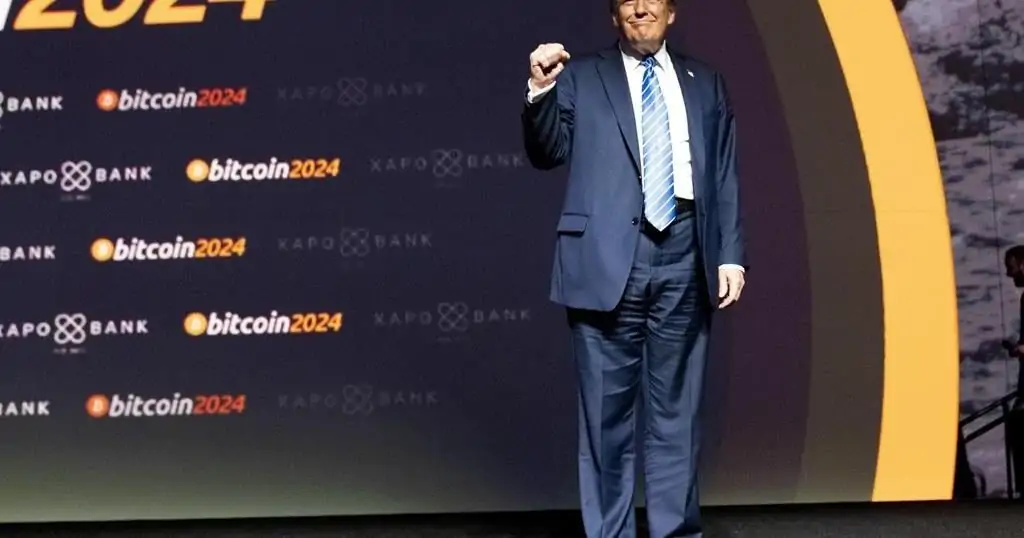NEW YORK (AP) — As money continues to pour into crypto following Donald Trump’s victory last week, bitcoin has climbed to yet another record high.
The world’s largest cryptocurrency topped $87,000 for the first time on Monday. As of around 3:45 p.m. ET, bitcoin’s price stood at $87,083, per CoinDesk, up over 28% in the last week alone.
That’s part of a rally across cryptocurrencies and crypto-related investments since Trump won the U.S. presidential election last week. Analysts credit much of the recent gains to an anticipated “crypto-friendly” nature of the incoming administration, which could translate into more regulatory clarity but also leeway.
Still, as with everything in the volatile cryptoverse, the future is hard to predict. And while some are bullish, others continue to warn of investment risks.
Here’s what you need to know.
Back up. What is cryptocurrency again?
Cryptocurrency has been around for a while now, but has come under the spotlight in recent years.
In basic terms, cryptocurrency is digital money. This kind of currency is designed to work through an online network without a central authority — meaning it’s typically not backed by any government or banking institution — and transactions get recorded with technology called a blockchain.
Bitcoin is the largest and oldest cryptocurrency, although other assets like Ethereum, Tether and Dogecoin have gained popularity over the years. Some investors see cryptocurrency as a “digital alternative” to traditional money — but it can be very volatile, and reliant on larger market conditions.
Why are bitcoin and other crypto assets soaring now?
A lot of it has to do with the outcome of last week’s election.
Trump was previously a crypto skeptic, but changed his mind and embraced cryptocurrencies during this year’s presidential race. He has pledged to make the U.S. “the crypto capital of the planet” and create a “strategic reserve” of bitcoin. His campaign accepted donations in cryptocurrency and he courted fans at a bitcoin conference in July. He also launched World Liberty Financial, a new venture with family members to trade cryptocurrencies.
Crypto industry players welcomed Trump’s victory, in hopes that he would be able to push through legislative and regulatory changes that they’ve long lobbied for. And Trump had previously promised that, if elected, he would remove the chair of the Securities and Exchange Commission, Gary Gensler, who has been leading the U.S. government’s crackdown on the crypto industry and repeatedly called for more oversight.
“Crypto rallied as Election Day progressed into the night and as it became increasingly clear that Trump would emerge victorious,” Citi analysts David Glass and Alex Saunders wrote in a Friday research note, pointing to larger industry sentiment around Trump being “crypto-friendly” and a potential shift in regulatory backing.
Even before the post-election rally, assets like bitcoin posted notable gains over the past year or so. Much of the credit goes to early success of a new way to invest in the asset: spot bitcoin ETFs, which were approved by U.S. regulators in January.
Inflows into spot ETFs, or exchange-traded funds, “have been the dominant driver of Bitcoin returns from some time, and we expect this relationship to continue in the near-term,” Glass and Saunders noted. They added that spot crypto ETFs saw some of their largest inflows on record in the days following the election.
What are the risks?
Crypto assets like bitcoin have a history of drastic swings in value — which can come suddenly and happen over the weekend or overnight in trading that continues at all hours, every day.
In short, history shows you can lose money as quickly as you’ve made it. Long-term price behavior relies on larger market conditions.
At the start of the COVID-19 pandemic, bitcoin stood at just over $5,000. Its price climbed to nearly $69,000 by November 2021, in a time marked by high demand for technology assets, but later crashed during an aggressive series of Federal Reserve rate hikes aimed at curbing inflation. Then came the 2022 collapse of FTX, which significantly undermined confidence in crypto overall.
At the start of last year, a single bitcoin could be had for less than $17,000. Investors, however, began returning in large numbers as inflation started to cool — and gains skyrocketed on the anticipation and then early success of spot ETFs. While some crypto supporters see the potential for more record-breaking days, experts still stress caution, especially for small-pocketed investors.
“Investors should only dabble in crypto with money that they can be prepared to lose,” Susannah Streeter, head of money and markets at Hargreaves Lansdown, said last week. “Because we’ve seen these wild swings in the past.”
What about the climate impact?
Assets like bitcoin are produced through a process called “mining,” which consumes a lot of energy. And operations relying on pollutive sources have drawn particular concern over the years.
Recent research published by the United Nations University and Earth’s Future journal found that the carbon footprint of 2020-2021 bitcoin mining across 76 nations was equivalent to the emissions from burning 84 billion pounds of coal or running 190 natural gas-fired power plants. Coal satisfied the bulk of bitcoin’s electricity demands (45%), followed by natural gas (21%) and hydropower (16%).
In the U.S., the Energy Information Administration notes that crypto mining across the country has “grown very rapidly over the last several years,” adding that grid planners have begun to express concern over increases in related electricity demand. Preliminary estimates released by the EIA in February suggest that annual electricity use from crypto mining probably represents between 0.6% to 2.3% of U.S. electricity consumption.
Environmental impacts of bitcoin mining boil largely down to the energy source used. Industry analysts have maintained that clean energy has increased in use in recent years, coinciding with rising calls for climate protections from regulators around the world.
_________
AP Business Writer Kelvin Chan contributed to this report from London.
